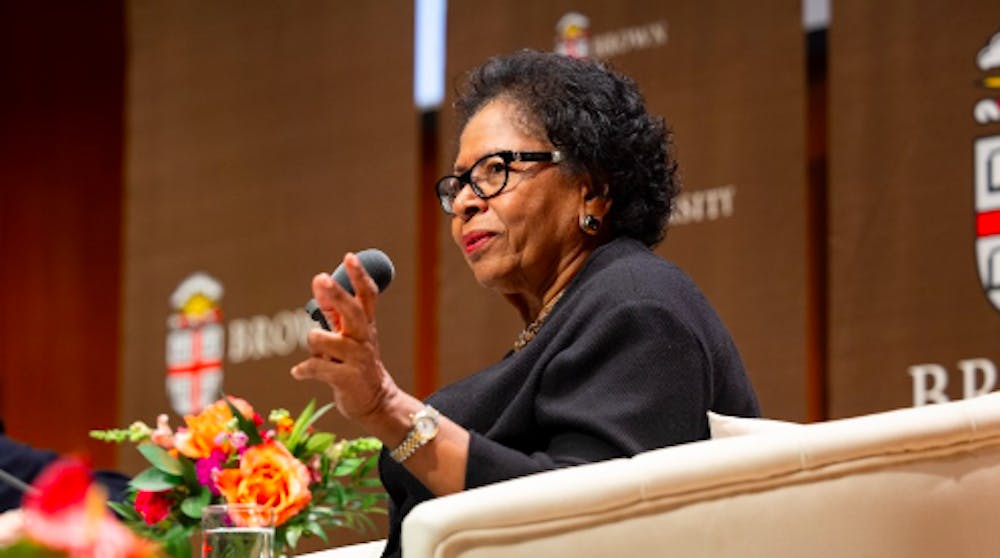In her first official visit to campus in seven years, former University President Ruth J. Simmons spoke to hundreds of campus community members about her new memoir, “Up Home: One Girl’s Journey,” and attended the ceremonial unveiling of the Ruth J. Simmons Center for the Study of Slavery and Justice, renamed in her honor.
“Up Home” is an autobiographical account that follows Simmons’s personal and professional life and experiences facing adversity. Starting in her birthplace of East Texas during a period of widespread segregation, the memoir reflects on the “improbability” of Simmons’s journey and the factors that made her success possible.
“I have come to understand how rich and varied any life can be irrespective of the circumstances thought to dictate a certain path,” Simmons wrote in the book.
During Thursday evening’s book talk, Simmons — joined by University President Christina Paxson P’19 P’MD’20 — shared details about her life with audience members, such as the mentors she encountered in college.
“I was lucky to come to understand that mentors weren’t always the people that you might expect,” Simmons said. She recounted how one of her mentors told her that her work was “the worst he’d ever seen” but ended up being an exceptionally positive force in her education.
During the event, Simmons also recounted some of the obstacles she faced in her upbringing, including growing up without books, being a first-generation college student and confronting impostor syndrome. These experiences, in part, led her to write “Up Home.”
“We need to understand that people living on that basis are not bereft of intelligence or potential — they are bereft of resources,” Simmons said in an interview with The Herald. “If we have the ability to get resources to them, their story can be very similar to my story. I wrote (“Up Home”) to bring into clarity what it means to advance from the margin.”
The book also touches on Simmons’s presidency at Brown. She was the first Black president of an Ivy League university, serving between 2001 and 2012.
Simmons’s presidency was a “time of energy” during which the University “worked to maintain its ethos,” said Anthony Bogues, professor and director of the Simmons Center and a faculty member during Simmons’s tenure.
One of Simmons’s presidential initiatives was the 2003 creation of the Steering Committee on Slavery and Justice, which researched the University’s historical relationship with slavery. Three years later, the Committee published its Slavery and Justice Report, which sparked the creation of the Simmons Center, then known as the Center for the Study of Slavery and Justice.
The decision to rename the center after Simmons was “more than unanimous,” Bogues said.
“We felt it was important to name the Center after her because she was a pioneer and an educator throughout the entire process,” he added.
Renaming the Center after Simmons is “poignant” given her devotion to helping students of color, said Taiese Bingham-Hickman, executive director of The Leadership Alliance, a Brown-founded talent development consortium that focuses on “underrepresented scholars,” according to their website.
Today, the report has been replicated at several institutions across the country. But Simmons told The Herald that the project was initially met with “outcry” over its “risky” nature.
“When I first started and announced the slavery project, one of my friends who was an academic at another university called me and said she thought I’d lost my mind,” Simmons said. “Because how in the world would I be able to withstand the scrutiny and criticism as an African-American president of (an) Ivy League university?”
Still, Simmons was “prepared to live with the criticism,” she said.
Along with the Steering Committee’s creation and the subsequent report, Simmons oversaw several other policy changes at the University. Both Simmons and Bogues made note of the University’s enactment of need-blind admissions during her tenure.
In Simmons’s final year as president of the University, 81% of Brown undergraduates said she “contributed to their Brown experience in a positive way,” according to a March 2012 poll by The Herald.
Long after Simmons’s time at the University, current students like Derrick Webb GS — who attended the Thursday evening event — still note the former president’s impact on campus.
“She’s really the reason why I feel like diversity, equity and inclusion have a value at Brown,” Webb said. “I don’t feel out of place here, and I think she really set the paradigm for that.”
Bogues said the work of the center is relevant to broader issues in the United States.
“The work of the Center is pivotal not just to higher education, but to thinking about questions of democracy in this country,” he said, adding topics of affirmative action and Brown’s relationship to Indigenous communities as hopeful next points of engagement.
Simmons emphasized the importance of dealing with contemporary issues of equity as a university.
“Recent challenges place universities in a very, very special place to expand upon equality where it is shrinking in other realms of society,” Simmons said in her interview with The Herald. In her book talk, Simmons cited the end of race-conscious admissions as one of these issues.
“I don’t think there’s a sector more powerful than the higher education sector to continue to promote these ideals that are embedded in our founding principles.”
Samantha was a University News editor overseeing the affinity and activism beat.





